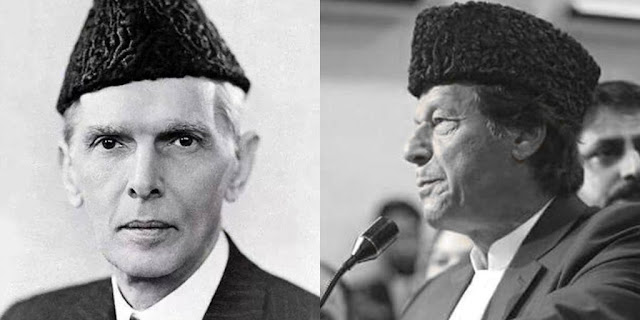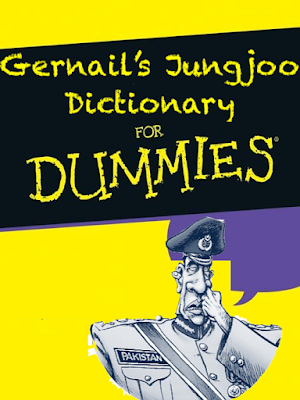From Jinnah’s Land of Pure to Imran’s Naya Land of Pure
From Jinnah’s Land of Pure to Imran’s Naya Land of Pure - a tell tale of poor choices
Pakistan Tehreek-e-Insaf (PTI) Chairman Imran Khan, now PM of Pakistan, introduced the term “Naya Pakistan” as key election slogan - a Pakistan which is corruption-free, where rule of law is equal for all, where the state is sensitive to expectations of all people and not just rich elite of Pakistan.
In his animated speeches Imran Khan promised employment for educated youth, skill development, improving agriculture and industrial investments and focus on tourism - which he rightly identified as Pakistan’s most under tapped potential.
While people of Pakistan have heard promises like these and more in the past, the difference this time is coming from a politician with a “clean” image, carefully curated by gracious help from fauj controlled media and judiciary. And this apparent illustration has caught the imagination of country primarily its young voters who have become weary of status quo and are desperate to see change in society.
Unlike choices of inspiration which are motivated by joy, purpose, sacrifice and excitement. Choices of desperation, on the other hand, are borne out of stress and anxiety, leading to poor judgements. Young voters of Pakistan, caught in the vicious cycle of poverty, extremism and ideology of negation, desperately longing for status quo change,and guided by all pervasive fauj chose the only option they were convinced to see -- Imran Khan.
But can PM Imran deliver on expectations?
One way to predict future is to look in history, observe precedence and see if it is reappearing all over again;
Jinnah, the founder of Pakistan, like young Imran was fascinated by West. Great Britain inspired Jinnah not just in his political life but as well in his personal taste. Jinnah donned Western style clothing and pursued fashion with fervour. It is claimed, Jinnah owned more than 200 tailored suits wearing them with heavily starched shirts, detachable collars and silk tie. Historian Stanley Wolpert had alleged in a book, quoting - M C Chagla, a close friend of Jinnah - that Jinnah was fond of eating pork, an act forbidden in Islam. Noteworthy to mention that Pakistan government had banned Wolpert's book.
Imran likewise, known as playboy of London admired Western lifestyle. Imran Khan would spend his evenings in Annabel's and Tramp nightclubs in London's West End and bedding series of debutantes - including the late Sita White (daughter of Lord White), Susannah Constantine, Lady Liza Campbell and the artist Emma Sergeant.
Jinnah admired British political institutions and preferred constitutional means over mass struggle & agitation; influenced by Gopal Krishnan Gokhale, Jinnah aspired during the early part of his political life to become “a Muslim Gokhale” but in the context of Indian nationalism. However, Jinnah was never a practising Muslim and despised religious or sectarian fanaticism. When Gandhi put his weight in support of Khilafat movement, Jinnah unequivocally criticised Gandhi for what he saw was ‘an endorsement of religious zealotry’. Similarly, Imran Khan had no particular leaning towards a sect, a religious school of thought or seminary. Imran when asked of his lifestyle once quipped, “I am a humble sinner”.
Early in his political career, Jinnah was instrumental in passing Child Marriages Restraint Act but soon ended up marrying a sixteen years young Parsi girl, with age gap of 24 years between them. Decades later, same Jinnah who found orthodoxy intolerable would go on to disown his daughter for marrying a non-Muslim.
From the infamous lothario of London to funding Darul Uloom Haqqania (factory of jihad) to marrying a full pardah peerni to visiting mazars to riling masses under the pretext of blasphemy against his political opponents - who would have predicted this makeover of Imran Khan?
At one point Jinnah opposed separate electorates for Muslims and Hindus, openly championing Nehru Report on joint electorates, but then went on to espouse communal and divisive two nation theory and so vociferously leading to agitation, rioting and bloodshed. Indistinguishably, Imran that once refused to become Prime Minister under General Musharraf, would go on to become pawn in showdown between ex-PM Nawaz Sharif and Pakistani Establishment. Launching himself from one container to another, months of agitation and street power, Imran of yester years would see his more sublime self-image of fakir crumble in quest for power.
Soon-to-be Governor-General of Pakistan, Jinnah outlined his vision of Pakistan in an address to the Constituent Assembly, delivered on 11 August 1947. He spoke of inclusive and impartial government, religious freedom, rule of law and equality for all - "in course of time Hindus would cease to be Hindus and Muslims would cease to be Muslims, not in the religious sense, because that is the personal faith of each individual, but in the political sense as citizens of the State."
Only to let it slip few months later, Jinnah wrote a letter to Egyptian imam and founder of the Muslim Brotherhood, Sheikh Hassan al-Banna. “I am writing to you, the great Muslim leader, to inform you that I am determined, by God’s will, to save Pakistan from the tyranny of imperialism and the various hostile currents,” he wrote. “I have therefore decided to follow the advice you kindly gave me in your recent letter, that my government should assume a purely Islamic character and work in close cooperation with the other strong international Islamic organizations which are headed by your Ikhwan-al-Muslimun society [the Muslim Brotherhood].”
Jinnah even asked al-Banna to send prominent Egyptian journalist Saleh El-Ashmawy to Pakistan so he could consult on “how to build our Islamic government and build [the] idea of the Islamic league.” [excerpts from Dr Ayesha Siddiqa’s examination of new archival material of Pakistan’s ties with the Kingdom of Saudi Arabia]
Almost identically, Imran Khan in a rally past year, roared to his followers “if I were to appoint economic advisor, would I appoint world renowned economist Atif Mian or my brother-in-law (chiding Nawaz Sharif’s appointment of Ishaq Dar as Finance Minister)?”, come September 2018 Prime Minister Imran Khan, appointed Atif Mian to Economic Advisory council, only to rescind the decision under pressure from religious right because Atif is born Ahmediyya.
Further, the tall claim of corruption-free Naya Pakistan has holes when looked through the prism of Khyber Pakhtunkhwa Ehtesab Commission (KPEC), which was abolished after costing exchequer Rs1.05 billion during the four years of its ineffectual existence. And his camaraderie with court ruled dishonest Jahangir Khan Tareen. Much like, Jinnah’s affirmation of representative democracy in his speeches while arbitrarily dismissing provisional government of NWFP as Governor General of Pakistan.
All I’m saying is, Jinnah sold a utopian idea of land of pure, and we are witness to how that played out in last 70yrs. Now if Imran is successful in selling Naya land of pure - who is to blame? The seller or the buyer?— Jungjoo Gernail ☪ (@GernailSaheb) July 24, 2018
Back to the initial question - Can PM Imran Khan deliver?
If Jinnah’s promise to masses led to Land of Pure with its 70 years baggage of disappointments and consistently poor choices, how would Naya Land of Pure be any different? -- Not particularly because the personality selling utopian dreams then & now are identically of weak character, opportunists, lacking integrity and ideologically barren but more fundamentally because the buyer is as desperate and intellectual indolent now, as they were 70 years back.
Fool me once, shame on you; fool me twice, shame on me.
Shalom
Gernailsaab & A.Kiyani
The authors are part-time researchers and students of South Asian Peace and Security Studies, with deep commitment to bring about change in South Asia, especially Pakistan. They have no political, government, NGO or media affiliations. And can be reached on Twitter @GernailSaheb & @Andromeda_JY
Published in DailyO.in dated 19th Sept 2018: https://www.dailyo.in/politics/imran-khan-muhammad-ali-jinnah-pakistan-naya-pakistan-comparison/story/1/26745.html
Published in DailyO.in dated 19th Sept 2018: https://www.dailyo.in/politics/imran-khan-muhammad-ali-jinnah-pakistan-naya-pakistan-comparison/story/1/26745.html




Asif to my dear darling friends:
ReplyDeleteLovely and incisive article that puts to rest any hopes that should arise in the citizens' mind that a "new" Absurdistan is in the making. In fact its DNA from the outset is a big lie because it was ill-conceived by its architects chiefly Jinnah and therefore it's destined to disappear or blow away and get absorbed in mother India. Only then a modicum of peace and relative calm may be achieved throughout the South Asia: As I would imagine in the place of today's Absurdistan four to six smaller tribal nation-states and satrapies without the need of having to support a standing army for the defense. Peace at last. (See you on Twitter!)